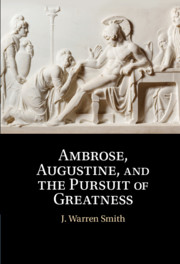Book contents
- Ambrose, Augustine, and the Pursuit of Greatness
- Ambrose, Augustine, and the Pursuit of Greatness
- Copyright page
- Dedication
- Contents
- Acknowledgments
- Abbreviations
- Introduction
- Part I The Problem of Greatness and the Great-Souled Man from Plato to Plutarch
- 1 Greatness of Soul
- 2 The Roman Ideal of Great-Souled Men
- Part II Ambrose’s Great-Souled Christians
- Part III Augustine and the Magnus Animus
- Epilogue
- Bibliography
- Index
1 - Greatness of Soul
The Perfection of Classical Virtue
from Part I - The Problem of Greatness and the Great-Souled Man from Plato to Plutarch
Published online by Cambridge University Press: 24 November 2020
- Ambrose, Augustine, and the Pursuit of Greatness
- Ambrose, Augustine, and the Pursuit of Greatness
- Copyright page
- Dedication
- Contents
- Acknowledgments
- Abbreviations
- Introduction
- Part I The Problem of Greatness and the Great-Souled Man from Plato to Plutarch
- 1 Greatness of Soul
- 2 The Roman Ideal of Great-Souled Men
- Part II Ambrose’s Great-Souled Christians
- Part III Augustine and the Magnus Animus
- Epilogue
- Bibliography
- Index
Summary
Writing in the mid-first century BC in his handbook of the Greek philosophical tradition, Tusculan Disputations, Marcus Tullius Cicero lays out Plato’s famous account of the immortality of the soul from Phaedo. Summarizing the force of the dialogue’s dramatic setting – i.e. Socrates’ waiting to drink the hemlock – Cicero places Socrates’ account of the soul and self-possession in the face of death within the context of his earlier self-representation at trial. Confident in his immortality and without fear of death, Socrates required no advocate to plead his innocence. Instead of pleading pathetically and humiliating himself before the three hundred who held his life in their hands, Socrates displayed an independence and firmness of character (libera contumacia) that bespoke his indifference to the jury’s power to condemn him to death. The equanimity with which he comported himself before the authorities that brought him to trial, Cicero explains, arose not from arrogance or vanity (superbia) but from magnitudo animi, or greatness of soul (Tusc. 1.29.71). Socrates’ independent spirit before his judges is not an expression of hubris (superbia) that reaches for glories beyond one’s right, which Cicero associates with Alexander’s naked ambition (Off. 1.26.90). Such superbia, in Cicero’s mind, invariably leads to tyranny and war, whether it is the arrogance of Tarquin the Proud or Gaius Julius Caesar (Tusc. 3.12.27). Rather, Socrates does not seek anything beyond himself but presents the case for his own innocence and virtue without pretention or affectation in the sure self-knowledge of a magnus animus. This description of Socrates – the philosopher for the Academy, the Stoics, and the Peripatetics – as possessing magnitudo animi, which he extols as splendidissimum (Off. 1.18.61), introduced to Roman philosophy the Greek notion of greatness of soul (μεγαλοψυχία).1
- Type
- Chapter
- Information
- Ambrose, Augustine, and the Pursuit of Greatness , pp. 23 - 67Publisher: Cambridge University PressPrint publication year: 2020



